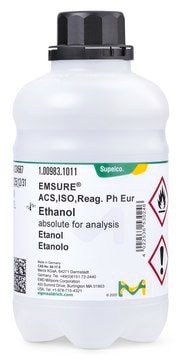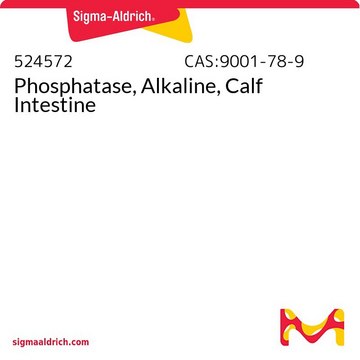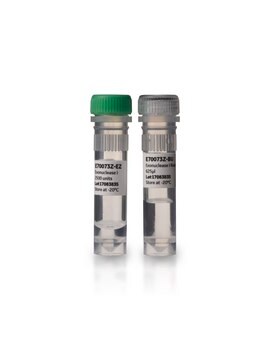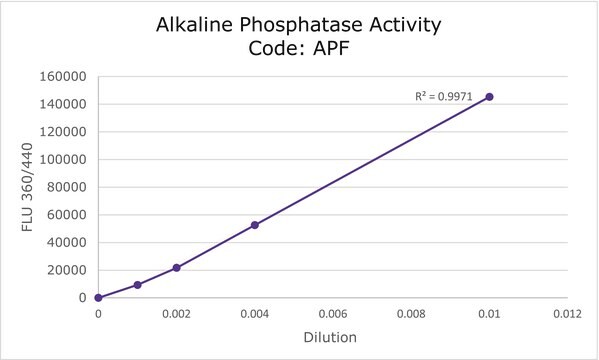RAP-RO
Roche
rAPid Alkaline Phosphatase
1 units/μg protein, optimum reaction temp. 37 °C
Synonyme(s) :
alkaline phosphatase, cloning of dna fragments
About This Item
Produits recommandés
Source biologique
bovine intestine
Niveau de qualité
Produit recombinant
expressed in Pichia pastoris
Forme
liquid
Activité spécifique
1 units/μg protein
Poids mol.
monomer 56 kDa by SDS-PAGE
Conditionnement
pkg of 1,000 U (04898133001 [1 U/μl])
pkg of 5,000 U (04898141001 [1 U/μl])
Fabricant/nom de marque
Roche
Concentration
<0.1 % (w/w)
Paramètres
37 °C optimum reaction temp.
Technique(s)
molecular cloning: suitable
Couleur
colorless
pH
7.6-8.5 (68 °F)
Solubilité
water: miscible
Adéquation
suitable for molecular biology
Numéro d'accès NCBI
Numéro d'accès UniProt
Application(s)
life science and biopharma
Activité étrangère
Nicking activity, none detected (up to 20 µl enzyme using pBR322-DNA/ 16h / 37°C)
unspecific endonuclease, none detected (up to 20 µl enzyme using Lambda-DNA 16 h/37 °C)
Température de stockage
−20°C
Informations sur le gène
bovine ... ALPI(280993)
Catégories apparentées
Description générale
Spécificité
Heat inactivation: rAPid Alkaline Phosphatase is inactivated by incubation at 75 °C for two minutes.
Application
- Use rAPid Alkaline Phosphatase in numerous applications, including: Removal of 5′-phosphoryl groups from nucleic acids
- Preparation of templates for 5′-end labeling
- Clean-up of PCR products by removal of dNTPs
- Dephosphorylation of proteins
Note: rAPid Alkaline Phosphatase is also included in the Rapid DNA Dephos & Ligation Kit, which enables fast and efficient dephosphorylation and ligation of sticky- or blunt-end DNA fragments. With this convenient kit, dephosphorylation of blunt and sticky 5′-overhanging ends is performed in ten minutes at +37 °C and ligation is completed in just five minutes at +15–25 °C.
Caractéristiques et avantages
- Eliminate contamination risk: Recombinant expression, and reliable and sensitive quality control tests ensure high purity.
- Replace your current phosphatases with an economical solution: rAPid Alkaline Phosphatase performs equally as well as Shrimp Alkaline Phosphatase or Bovine Alkaline Phosphatase.
- Eliminate the risk of animal-derived diseases: Expression in Pichia pastoris ensures consistency and safety.
- Benefit from rapid heat inactivation: rAPid Alkaline Phosphatase is inactivated after only 2 minutes at +75°C.
- Obtain consistent performance: rAPid Alkaline Phosphatase has excellent stability during storage compared to other alkaline phosphatases.
Conditionnement
Qualité
Définition de l'unité
Volume Activity: 1 U/μl
Autres remarques
Composants de kit seuls
- rAPid Alkaline Phosphatase Buffer 10x concentrated
- rAPid Alkaline Phosphatase 1 U/μl
Code de la classe de stockage
12 - Non Combustible Liquids
Classe de danger pour l'eau (WGK)
WGK 1
Point d'éclair (°F)
does not flash
Point d'éclair (°C)
does not flash
Faites votre choix parmi les versions les plus récentes :
Déjà en possession de ce produit ?
Retrouvez la documentation relative aux produits que vous avez récemment achetés dans la Bibliothèque de documents.
Les clients ont également consulté
Notre équipe de scientifiques dispose d'une expérience dans tous les secteurs de la recherche, notamment en sciences de la vie, science des matériaux, synthèse chimique, chromatographie, analyse et dans de nombreux autres domaines..
Contacter notre Service technique








